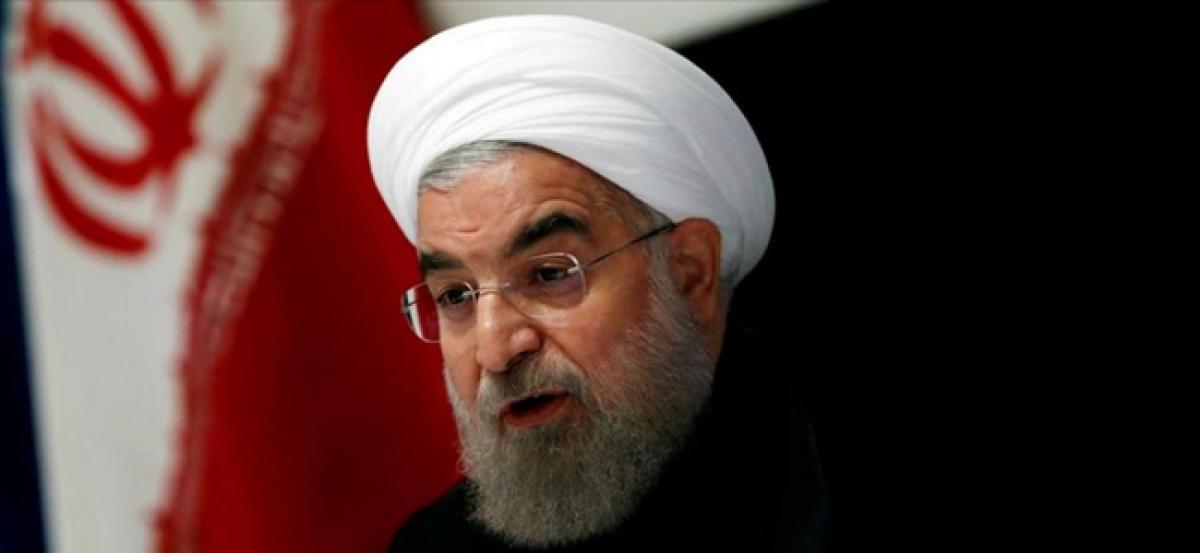Live
- Starc, Hazlewood, Cummins added to BBL 14 supplementary lists
- Flood risk in low-lying areas of Chennai as Chembarambakkam Lake’s water level rises
- Pushpa 2 Theatre Canteen Owner Bites Customer’s Ear in Gwalior
- RG Kar tragedy: Statement of forensic doctor who took pictures of victim’s body crucial for CBI
- Include Valmiki community in ST list, MP Ambica pleads
- Nara Lokesh Urges Rapid Investment Approvals to Boost Employment in MSME Sector
- Chandrababu Advocates Strict Measures for Social Welfare and Infrastructure Development in AP
- Show of brotherhood by Vijayan, Stalin at event to honour Dravidian icon
- District Collectors’ conference with CM begins
- Celebrations kick off in Saudi Arabia to welcome FIFA World Cup 2034
Just In

Iran\'s president must get a second term to secure the economic benefits that he promised would result from a diplomatic thaw with the West, Vice President Masoumeh Ebtekar said ahead of a May 19 election.
TEHRAN: Iran's president must get a second term to secure the economic benefits that he promised would result from a diplomatic thaw with the West, Vice President Masoumeh Ebtekar said ahead of a May 19 election.
Hassan Rouhani's hardline challengers for the presidency, some of whom are close to supreme leader Ayatollah Ali Khamenei, say he traded away too much in a 2015 deal with world powers that limited Iran's nuclear work but failed to deliver sufficient rewards.
In a rare interview with a trio of foreign reporters at an EU-Iran business forum on Sunday, Ebtekar, one of Iran's 12 vice presidents, said voters should not give up on Rouhani.
"He needs more time ... He has to be given a chance to be able to continue his programme," said Ebtekar, one of Iran's most prominent women politicians.
"Rouhani has done a lot to overcome some of the hurdles that the investors find when they are coming," she said in a nod to concerns over red tape and opaque rules voiced by foreign companies that Iran hopes to attract.
As a young woman, Ebtekar was the face of the radical students who occupied the U.S. Embassy and held its staff hostage for 444 days at the time of the 1979 Islamic revolution.
Known as "Mary", she spoke in calm, fluent English to the world's media, putting the hostage-takers' side of the incident that remains a painful memory for the United States and is one of the reasons Wasington considers the Islamic Republic a pariah state.
At 56, she is now firmly in the reformist camp, endorsing Rouhani's vision of a freer society and diplomatic detente after the lifting of sanctions under the deal he engineered.
If hardliners describe the nuclear deal as a limited engagement with the West on a single issue, Ebtekar sees it as the beginning of a new era of international engagement to realise what she says are the hopes of Iran's younger generation to end its long isolation.
HIGH EXPECTATIONS
"There is a lot being done which is creating a lot of hope and optimism but at the same time the expectations for the nuclear deal are still very high," said Ebtekar, her smiling face framed by a traditional black chador over a turquoise scarf.
With unilateral U.S. sanctions still in place, Ebtekar said voters understood that it was not Rouhani's fault that the nulcear deal had yet to improve their daily lives.
"They understand that mostly the problem is coming from outside. Our government has done its share ... now it is up to our partners in the deal to do their share as well.
"This opening up will create a better atmosphere, and I hope that they will – particularly countries like the United States – will stand up to their commitments," Ebtekar said.
Ayatollah Khamenei's scepticism over Rouhani's detente policy is echoed by his strongest challenger, Ebrahim Raisi, a hardline cleric seen as a possible future supreme leader, who says Iran has no need of foreign help.
Ebtekar, however, said the election is Rouhani's to lose, pointing to parliamentary polls in which the conservatives lost ground. The alliance of moderates and reformists that helped carry him to power in 2013, she said, "gives him a very strong position."
Ebtekar rejected the view of Western and Gulf Arab states that Iran is an agressor in the Middle East, saying it has peaceful intentions but also had the right to defend itself from foreign threats.
Iran's backing of Syrian President Bashar al-Assad, the militant Lebanese group Hezbollah and alleged support for Yemen's Houthi fighters has put it at odds with the United States and regional rival Saudi Arabia.
"We are looking forward to play our role to promote peace and also security in the region," Ebtekar said.
"But it's natural for the people living in this region to defend themselves, it's very natural for Lebanon to defend itself, Syria, the Palestinians. So defence is another issue."

© 2024 Hyderabad Media House Limited/The Hans India. All rights reserved. Powered by hocalwire.com







